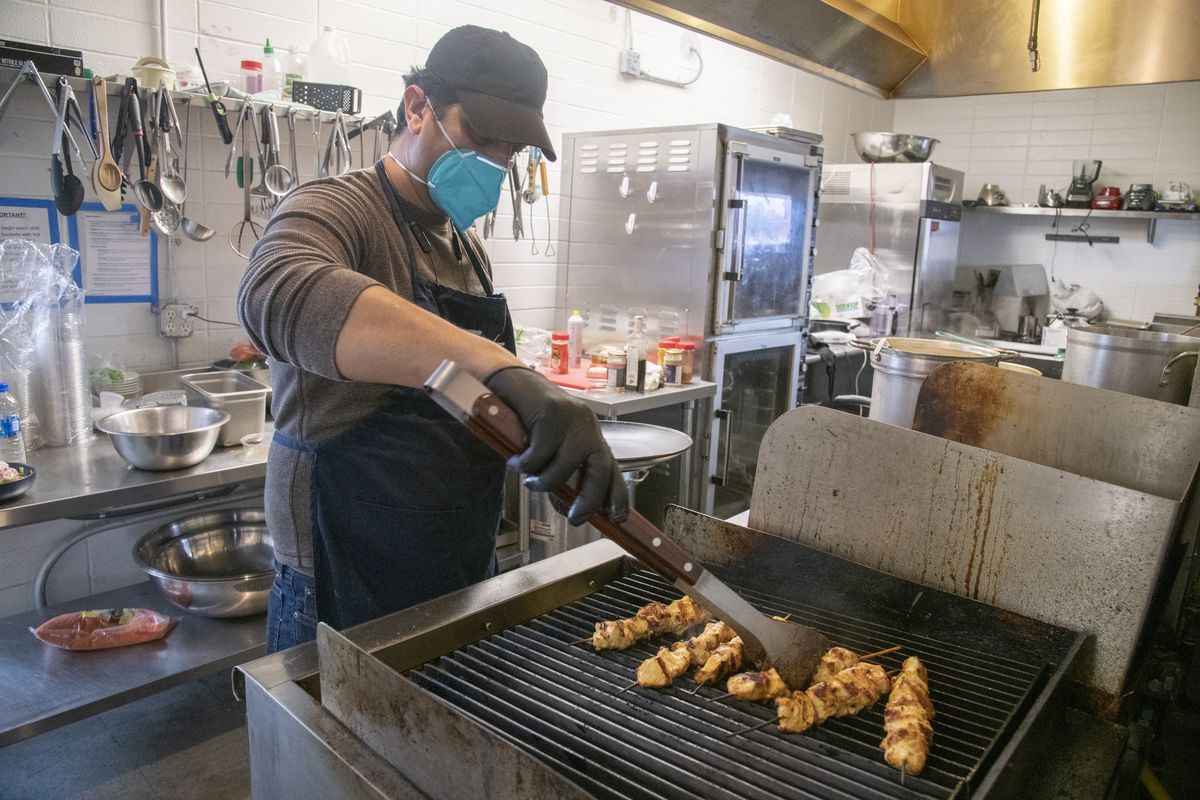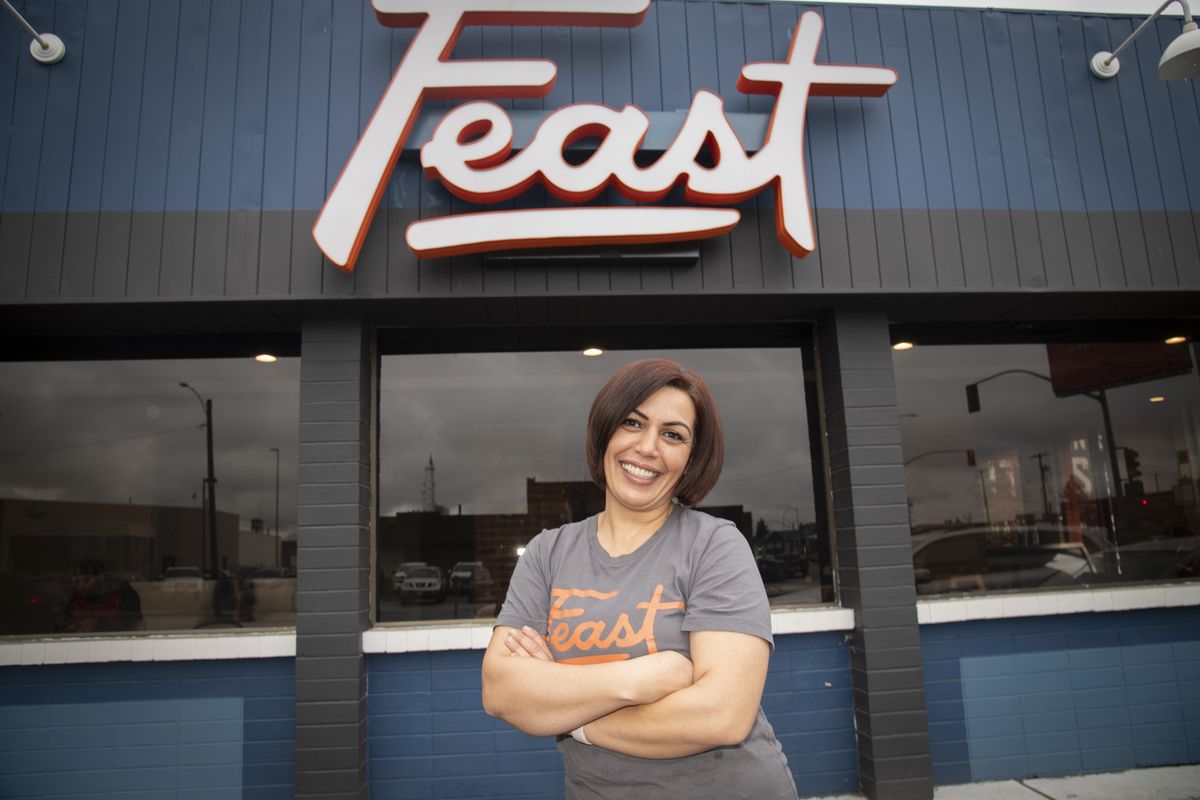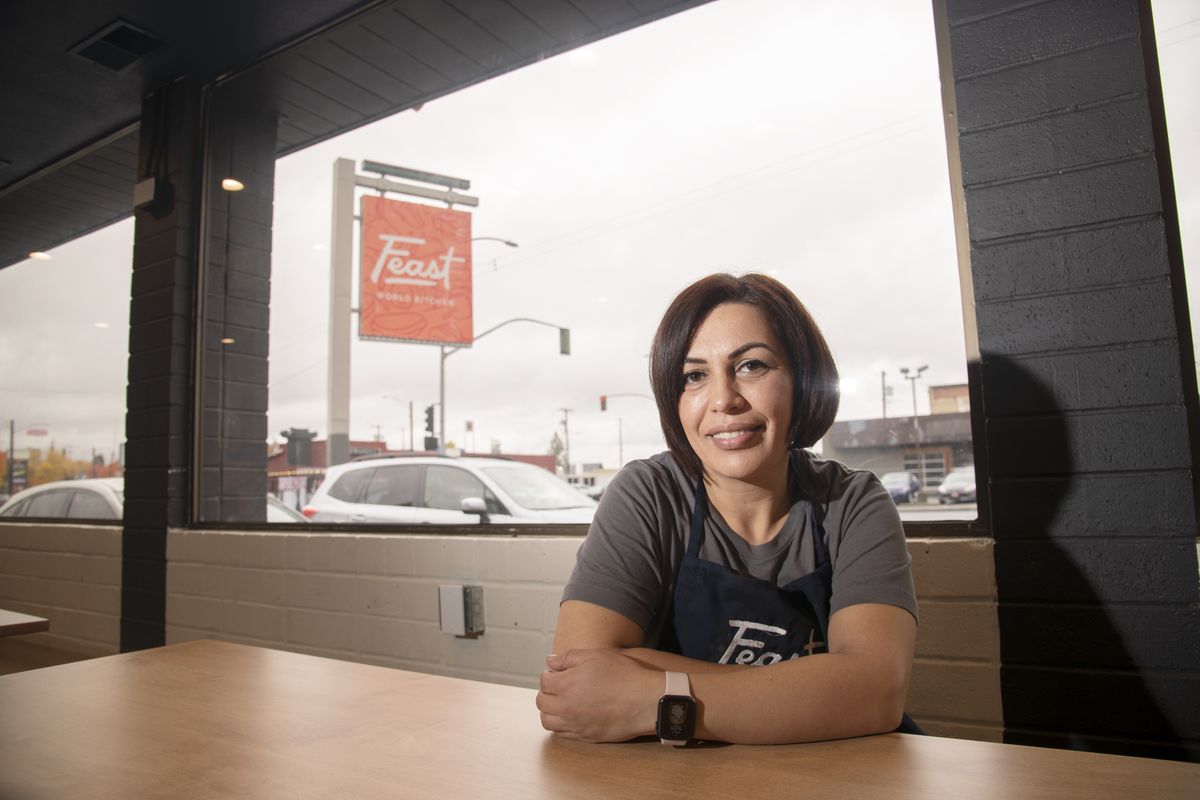Food is a language, a bridge and an opportunity: Jordanian chef Maisa Abudayha directs Spokane’s Feast Kitchen
Maisa Abudayha is the first head chef for Feast Kitchen in downtown Spokane, shown Friday. Abudayha is of Jordanian descent. (Jesse Tinsley/THE SPOKESMAN-REVIEW)Buy a print of this photo
While in her home country of Jordan, Maisa Abudayha earned a bachelor’s degree in information technology and an international license as a stock broker. After she immigrated from Jordan’s urban outskirts to Spokane, she struggled to buy a rotisserie chicken to feed her four children.
“They gave me a work authorization card at the beginning of my asylum and some cash,” Abudayha said of her 2018 immigration. “After that, I went to the store to buy stuff, and I went to get one of those rotisserie chickens. They told me I couldn’t afford it. It really hurt me.”
Now she is the first to be employed as chef program director at Feast Kitchen, using the love of her Jordanian culture and helping immigrants as a compass to guide her.
In Abudayha’s world, food is a language, a bridge and an opportunity. She remembers not knowing English well, but giving her 85-year-old neighbor, whom she now calls “Dad,” cookies for Christmas.
“He said ‘No, keep them for your kids,’ ” Abudayha recalled. “From that, my husband began shoveling snow for him. My neighbor helped my husband become a construction worker now.”
Abudayha’s approach to food is about balancing Jordan’s traditional foods with America’s culinary styles. Fermented yogurt is an integral piece of mansaf, a famous Jordanian dish and Abudyah’s favorite, but she realized most Americans don’t eat yogurt outside of breakfast and omitted it from the meal.
“I’ve added more flavor to my makmoore that’s made with tahini and rice,” she said about the American twist. “I add chickpeas in between or I’ll make a vegetarian one, because in general, in Jordan, we love meat.”
Choices like these have led to Abudayha’s climb within the food chain of Feast Kitchen, which is a nonprofit restaurant that serves food prepared by a rotating selection of immigrants and former refugees. Ross Carper, the founder of Feast Kitchen, met Abudayha through First Presbyterian Church’s immigration initiatives. In 2019, Abudayha asked to borrow Carper’s food truck on the weekends and they began building from there.
“She’s our most valuable team member and she brings energy, joy and expertise, not only in food service or catering but in how to build a life here in Spokane, and that’s what she and her family have done,” Carper said. “She’s been radically tenacious about reaching those gaps between ethnicities and former immigrants.”
Jamella Gow, a professor at Gonzaga University who explores the identity and community-formation of Afro-Caribbean migrants, teaches courses rooted in the immigrant experience, globalization and culture. She views Abudahya’s identity as a Jordanian woman and directing chef as a place of both “preservation and reinvention.”
“Each of those chefs bring their own nuances as well,” Gow said. “There’s a diversity in that which is wonderful to think about. Each chef is bringing their culinary context in there and you’re going to get it once you eat their food.”
Iraqi chef Fadhaa Almayyahi, for example, has served chicken kababs with tomato sauce, long-grain yellow rice with green peas and carrots with a garden salad. The Mediterranean tradition of chicken kebabs prevailed, but the American tradition of a meat, veggie and a grain was apparent. One of the optional sides was a garden salad sprinkled with sumac, a purple seasoning.
Abudayha directs more than 60 chefs, like Almayyahi, who originate from five continents. With chefs’ origins peppered throughout the world, she saw the opportunity for them to quickly address issues with immigrants.
“Our work is split between feeding Spokane and immigrants who just need assistance with something, needing clothes or just help,” Abudayha said. “This building is more than just cooking.”
Language barriers can hinder the assistance that immigrants need and, with chefs who potentially hail from the same place, Feast Kitchen offers a space where food can be cooked and problems solved.
“Some chefs come to me and need help with this or that, but they may be Hispanic and I don’t speak Spanish,” said Abudayha who speaks Arabic and English. “Here, what we started doing is asking those who speak the language, ‘Hey, do you have five minutes to translate this document for me?’ or ‘There’s a woman on the phone who needs directions, can you help?’ ”
Since Carper is renting the building from First Presbyterian Church, some of its members are affiliated with community institutions such as Gonzaga University and CHAS Health. Church volunteers offer to help chefs apply for business licenses, savings accounts or other opportunities to sustain their new lives.
World Relief has pitched in by providing transition services for immigrants, and pointed them to Feast Kitchen if they have a desire to cook.
Carper felt the need to provide a higher wage for Abudayha as she took on more roles. The Smith-Barbieri Progressive Fund donated half of the $35,000 goal, then challenged other community organizations to match.
The rest of the money was raised at an event featuring Feast Chef Yalda Mohmand from Afghanistan and best-selling author Jess Walter “as well as some email encouragement,” Carper said.
“By sustaining this critical, family-wage job for Maisa, donors are not only supporting her family, but supporting her incredible work that makes an impact with dozens of other immigrant and former refugee families,” Carper said.
Now Abudayha has a concrete wage and can still earn extra cash with additional catering services, but most of all, she has more to spend with her four children and husband. Being chef program director is what Abudayha called “my dream but also my job.”
“My job is a balance of ‘I’m giving you training to do a great job’ and ‘I need my customers to be satisfied with my food,’ ” Abudayha said. “You have to be patient in the kitchen and smart enough to advise them to do whatever is needed.
“But at the end of the day, it’s all about when a chef (calls) me and says, ‘Thank you, Maisa. Yesterday, I sent some money to my mom.’ ”



